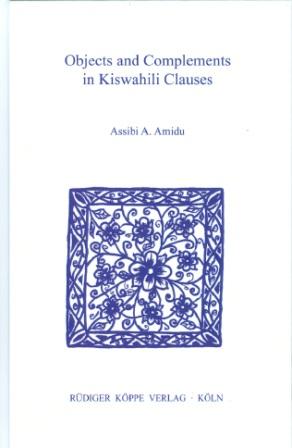
Objects and Complements in Kiswahili Clauses
A Study of their Mechanisms and Patterns
Author: Assibi Apatewon Amidu. Series edited by: Wilhelm J.G. Möhlig †, Bernd Heine.
Series: GA Grammatical Analyses of African Languages Volume 44
201318 pp. Roman, 677 pp.
numerous language examples with glossing and translation, 27 pp. name and subject index
Text language(s): English
Format: 160 x 240 mm
1210 g
Hardcover
€ 98.00
Buy 'Objects and Complements in Kiswahili Clauses' as a downloadable PDF document directly from our online shop »
Order 'Objects and Complements in Kiswahili Clauses' as print edition »
The book looks at the question of objects and complements in Kiswahili clauses. It draws attention to the fact that in Kiswahili, cognate objects are very common because deverbatives or nouns derived from verbs are a central part of the creation of new nouns in the Bantu languages for all categories of subject, object and complements.
Next, the book focuses on what objects and complements are in Kiswahili and points out that translational equivalents are often used to dismiss legitimate objects their status as objects or complements in the language.
The study also looks at subject-object inversion / transposition and points out that the pattern extends beyond locative inversion syntax and is widespread in Kiswahili and Bantu.
Next, attention focuses on passivization. Finally, the study draws attention to the existence of PP arguments that function as objects and subjects just like NPs do. The book concludes that given the weight of evidence, transitivity theory will never be the same again.
Under these links you will find further analyses of transitivity / verb valency in Kiswahili and other African languages, publications by the author, as well as the review of the study by Beata Wóitowicz:
Accompanying material:
- Argument and Predicate Relations in Kiswahili
(ISBN 978-3-89645-042-5 ) - Classes in Kiswahili
(ISBN 978-3-89645-022-7 ) - Locative and Non-locative in Kiswahili Bantu
(ISBN 978-3-89645-713-4 ) - Matrix Nominal Phrases in Kiswahili Bantu
(ISBN 978-3-89645-550-5 ) - Pronouns and Pronominalizations in Kiswahili Grammar
(ISBN 978-3-89645-543-7 ) - Reflexive and Reciprocal Syntax Revisited
(ISBN 978-3-89645-707-3 ) - Reflexives and Reflexivization in Kiswahili Grammar
(ISBN 978-3-89645-028-9 ) - Semantic Assignment Rules in Bantu Classes
(ISBN 978-3-89645-703-5 ) - Transitivity in African Languages
(ISBN 978-3-89645-726-4 ) - Transitivity in Swahili
(ISBN 978-3-927620-37-7 ) - Transitivität und Verbvalenz im Swahili
(ISBN 978-3-89645-712-7 )
Reviews
In conclusion the book is a main of knowledge on Swahili morphology and syntax. It provides a lot of information that lie beyond the core scope of the book. It gives a solid basis and firm explanations to understanding peculiarities of Swahili grammar. The Author takes the language structure as a starting point for his analysis, and rejects the use of translational approach that, in his view is totally inadequate in the descriptions of Bantu languages. Throughout the book, the Author provides evidence for how the analysis based on the English translation turns out false and misleading. Furthermore, the Author shows how acknowledgement of variation and diversity without overlooking uniformity in different languages may contribute to writing better universal grammars. Undoubtedly, the book challenges the traditional descriptions of Swahili grammar and should be of interest not only to linguists but lexicographers, language teachers and students as well.
Beata Wójtowicz in Studies of the Department of African Languages and Cultures, 49/2015, 180-183
PDF documents:
 | Review by Beata Wóitowicz | (≈ 2 MB) |
| « back | Print version | [top] |
 Books
Books Audio
Audio Biographies
Biographies Series
Series Festschrifts
Festschrifts Journals
Journals